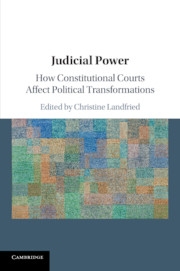Book contents
- Judicial Power
- Judicial Power
- Copyright page
- Contents
- Contributors
- Acknowledgments
- Introduction
- Part I Democratic Legitimacy of Judicial Power
- Part II Democratic Effectiveness of Judicial Power
- 6 Constitutional Court and Politics
- 7 Democracy, Political Crisis, and Constitutional Jurisdiction
- 8 Judicial Power and European Integration
- 9 Fundamental Rights in Europe after Opinion 2/13
- Part III Legitimacy, Effectiveness, and Judicial Methods of Decision-Making
- Part IV Judicial Power in Processes of Transformation
- Index
9 - Fundamental Rights in Europe after Opinion 2/13
The Hidden Promise of Mutual Trust
from Part II - Democratic Effectiveness of Judicial Power
Published online by Cambridge University Press: 27 January 2019
- Judicial Power
- Judicial Power
- Copyright page
- Contents
- Contributors
- Acknowledgments
- Introduction
- Part I Democratic Legitimacy of Judicial Power
- Part II Democratic Effectiveness of Judicial Power
- 6 Constitutional Court and Politics
- 7 Democracy, Political Crisis, and Constitutional Jurisdiction
- 8 Judicial Power and European Integration
- 9 Fundamental Rights in Europe after Opinion 2/13
- Part III Legitimacy, Effectiveness, and Judicial Methods of Decision-Making
- Part IV Judicial Power in Processes of Transformation
- Index
Summary
- Type
- Chapter
- Information
- Judicial PowerHow Constitutional Courts Affect Political Transformations, pp. 202 - 230Publisher: Cambridge University PressPrint publication year: 2019
- 1
- Cited by



